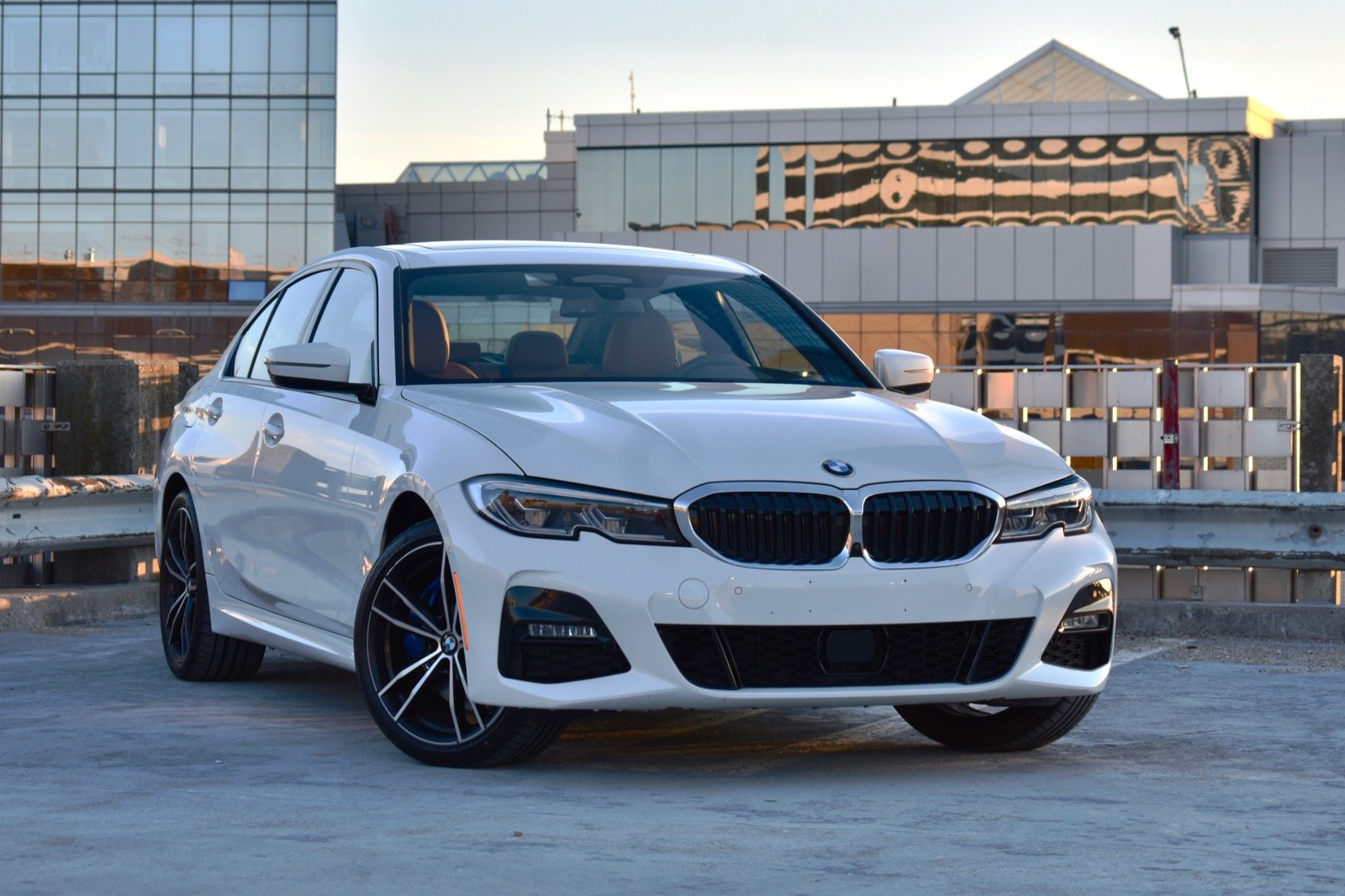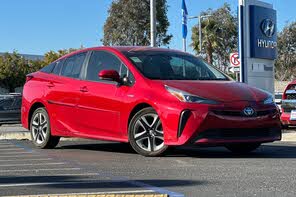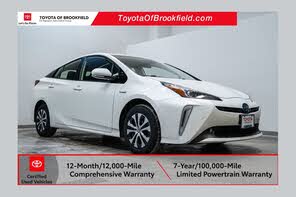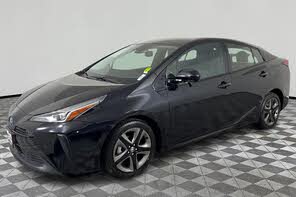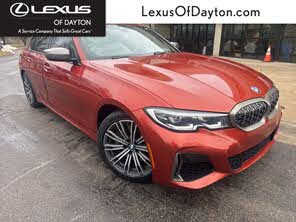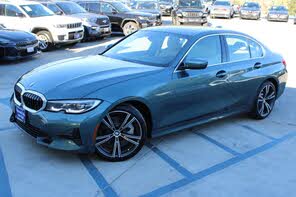2020 Toyota Prius vs 2021 BMW 3 Series
Overview | |
MSRP$24,325 | MSRP$41,250 |
Listings108 | Listings543 |
Ratings & Reviews | |
User Reviews | User Reviews |
Expert reviews7.5 out of 10 | Expert reviews6.8 out of 10 |
Pros
Cons
| Pros
Cons
|
2020 Toyota Prius Reviews SummaryEver heard of an eponym? It’s a brand or product that is so popular that it’s come to define its respective market. Think of Kleenex for tissues or Band-Aid for medical bandages. For hybrids, the Toyota Prius has ascended to near-eponym status. It was one of the first—and remains one of the most popular—hybrids ever made. As automakers across the industry are rolling out more hybrid models, the Prius continues to be the standard-bearer of this genre. This is largely due to the fact that the Prius is a dedicated hybrid, rather than a hybrid variant of an existing model. Throughout the industry, different companies are taking different approaches to alt-fuel vehicles, including full-electric and hydrogen fuel cell powertrains. The Prius endures as the leader in hybrid power due to a focus on fuel efficiency that doesn’t compromise on style, drivability, and versatility. So how does the Prius hold its ground as more players enter the fray? Read on to find out. | |
2021 BMW 3 Series Reviews SummaryEarly generations of the BMW 3 Series redefined what a luxury car could be, justifying their prestige badge with sporty driving dynamics and impeccable engineering. BMW changed the luxury-car paradigm, proving that nimble sports sedans could be just as desirable as wood-encrusted land yachts. The 3 Series spawned a number of imitators, including the Audi A4, Mercedes-Benz C-Class, and Lexus IS. Those sedans, along with the Acura TLX, Alfa Romeo Giulia, Cadillac CT4, and Infiniti Q50 (which wear more recently-introduced nameplates) still form the 3 Series’ competitive set, but the car itself has changed. Introduced for the 2019 model year, the current-generation 3 Series (codenamed G20) feels more like a traditional luxury sedan, with a greater emphasis on comfort and convenience than previous generations. The manual transmission is gone, as are the wagon and 3 Series GT hatchback body styles. The 3 Series coupe and convertible were re-badged as the 4 Series beginning with the 2014 model year. The biggest change for the 2021 BMW 3 Series is the addition of the 330e plug-in hybrid model to the lineup, so that’s what we test drove for this review. BMW also offers 330i and M340i versions, and there’s an M3 performance model on the way. | |
No video found | No video found |
Popular Features & Specs | |
Engine1.8L 121 hp I4 Hybrid | Engine2.0L 255 hp I4 |
Drive TrainFWD | Drive TrainRWD |
Seating Capacity5 | Seating Capacity5 |
Horsepower | Horsepower255 hp @ 5000 rpm |
EV Battery Capacity0.7 kWh | EV Battery Capacity |
MPG City58 | MPG City26 |
MPG Highway53 | MPG Highway36 |
Engine | |
Engine Name1.8L 121 hp I4 Hybrid | Engine Name2.0L 255 hp I4 |
Torque | Torque295 lb-ft @ 1450 rpm |
Horsepower | Horsepower255 hp @ 5000 rpm |
DrivetrainFWD | DrivetrainRWD |
Fuel Economy | |
EV Battery Capacity0.7 kWh | EV Battery Capacity |
MPG City58 | MPG City26 |
MPG Highway53 | MPG Highway36 |
Interior | |
Seating Capacity5 | Seating Capacity5 |
Key Features | |
Navigation System | Navigation SystemStandard |
Sunroof/Moonroof | Sunroof/MoonroofStandard |
Safety | |
Front Crash Overall4 | Front Crash Overall5 |
Side Crash Overall5 | Side Crash Overall5 |
Dimensions & Capacity | |
Cargo Space27.4 cu ft | Cargo Space13.0 cu ft |
Curb Weight3010 lbs | Curb Weight3589 lbs |
Height57.9 in | Height56.8 in |
Length180.0 in | Length185.7 in |
Width69.3 in | Width81.4 in |
Wheelbase106.3 in | Wheelbase112.2 in |
Maximum Payload825 lbs | Maximum Payload |
Number of doors4 | Number of doors4 |
Overview | ||
MSRP | $24,325 | $41,250 |
Listings | ||
Ratings & Reviews | ||
User reviews | ||
Expert reviews | 7.5 out of 10Read full review | 6.8 out of 10Read full review |
Pros & cons | Pros
Cons
| Pros
Cons
|
Summary | Ever heard of an eponym? It’s a brand or product that is so popular that it’s come to define its respective market. Think of Kleenex for tissues or Band-Aid for medical bandages. For hybrids, the Toyota Prius has ascended to near-eponym status. It was one of the first—and remains one of the most popular—hybrids ever made. As automakers across the industry are rolling out more hybrid models, the Prius continues to be the standard-bearer of this genre. This is largely due to the fact that the Prius is a dedicated hybrid, rather than a hybrid variant of an existing model. Throughout the industry, different companies are taking different approaches to alt-fuel vehicles, including full-electric and hydrogen fuel cell powertrains. The Prius endures as the leader in hybrid power due to a focus on fuel efficiency that doesn’t compromise on style, drivability, and versatility. So how does the Prius hold its ground as more players enter the fray? Read on to find out. | Early generations of the BMW 3 Series redefined what a luxury car could be, justifying their prestige badge with sporty driving dynamics and impeccable engineering. BMW changed the luxury-car paradigm, proving that nimble sports sedans could be just as desirable as wood-encrusted land yachts. The 3 Series spawned a number of imitators, including the Audi A4, Mercedes-Benz C-Class, and Lexus IS. Those sedans, along with the Acura TLX, Alfa Romeo Giulia, Cadillac CT4, and Infiniti Q50 (which wear more recently-introduced nameplates) still form the 3 Series’ competitive set, but the car itself has changed. Introduced for the 2019 model year, the current-generation 3 Series (codenamed G20) feels more like a traditional luxury sedan, with a greater emphasis on comfort and convenience than previous generations. The manual transmission is gone, as are the wagon and 3 Series GT hatchback body styles. The 3 Series coupe and convertible were re-badged as the 4 Series beginning with the 2014 model year. The biggest change for the 2021 BMW 3 Series is the addition of the 330e plug-in hybrid model to the lineup, so that’s what we test drove for this review. BMW also offers 330i and M340i versions, and there’s an M3 performance model on the way. |
Video | No video found | No video found |
Popular Features & Specs | ||
Engine | 1.8L 121 hp I4 Hybrid | 2.0L 255 hp I4 |
Drive Train | FWD | RWD |
Seating Capacity | 5 | 5 |
Horsepower | 255 hp @ 5000 rpm | |
EV Battery Capacity | 0.7 kWh | |
MPG City | 58 | 26 |
MPG Highway | 53 | 36 |
Engine | ||
Engine Name | 1.8L 121 hp I4 Hybrid | 2.0L 255 hp I4 |
Torque | 295 lb-ft @ 1450 rpm | |
Horsepower | 255 hp @ 5000 rpm | |
Drivetrain | FWD | RWD |
Fuel Economy | ||
EV Battery Capacity | 0.7 kWh | |
MPG City | 58 | 26 |
MPG Highway | 53 | 36 |
Interior | ||
Seating Capacity | 5 | 5 |
Key Features | ||
Navigation System | Standard | |
Sunroof/Moonroof | Standard | |
Safety | ||
Front Crash Overall | 4 | 5 |
Side Crash Overall | 5 | 5 |
Dimensions & Capacity | ||
Cargo Space | 27.4 cu ft | 13.0 cu ft |
Curb Weight | 3010 lbs | 3589 lbs |
Height | 57.9 in | 56.8 in |
Length | 180.0 in | 185.7 in |
Width | 69.3 in | 81.4 in |
Wheelbase | 106.3 in | 112.2 in |
Maximum Payload | 825 lbs | |
Number of doors | 4 | 4 |
The 2020 Toyota Prius retained its iconic jellybean-like shape, optimized for aerodynamics. Over the years, Toyota made subtle changes to make it appear more like a sedan, but it remained a hatchback. The Prius had a futuristic style that still looked contemporary, with a cabin defined by its central instrumentation and gauges. Trim levels ranged from the entry-level L Eco to the range-topping Limited, each adding more features and luxury.
The 2021 BMW 3 Series, specifically the G20 model, aimed to resemble its larger siblings, the 5 Series and 7 Series. However, it lacked the design charm of the classic E30, appearing somewhat stuffy with its oversized grille. The interior design was nice but marred by unimpressive materials unless upgraded. The M Sport trim package added some flair with 19-inch wheels and blue-painted brake calipers, but the standard Sport Line trim was more subdued.


















The 2020 Toyota Prius featured a 1.8-liter four-cylinder engine paired with an electric motor, producing a combined 121 horsepower and 105 pound-feet of torque. It offered both front-wheel drive (FWD) and an all-wheel-drive (AWD) variant. The Prius had smooth acceleration and seamless transitions between electric and conventional power. It offered three drive modes—EV, Eco, and Power—each catering to different driving needs. The unique shifter design and Engine Braking mode added to its distinctive driving experience. The Prius handled well for a hybrid, with a low center of gravity and a smooth ride.
The 2021 BMW 3 Series offered three powertrains: a 2.0-liter turbocharged four-cylinder engine in the 330i with 255 horsepower and 295 pound-feet of torque, a 330e plug-in hybrid with 288 horsepower and 310 pound-feet of torque, and the M340i with a turbo inline-six producing 382 horsepower and 369 pound-feet of torque. All models came with an eight-speed automatic transmission and the option of rear-wheel drive (RWD) or xDrive all-wheel drive (AWD). The M340i could accelerate from 0 to 60 mph in 4.2 seconds, while the 330i took 5.6 seconds. Despite its technical prowess, the 3 Series lacked the engaging driving experience of its predecessors, feeling disconnected and less fun to drive.
The 2020 Toyota Prius made excellent use of its compact platform, offering spacious and comfortable front seats with good visibility. The rear seats were also roomy, though taller passengers might struggle with headroom. The Prius boasted 50.7 cubic feet of cargo space with the rear seats folded and up to 27.4 cubic feet with the seats up, making it one of the most versatile hybrids available.
The 2021 BMW 3 Series provided better-than-average interior space for a small luxury sedan. It had the best rear headroom in its segment and above-average front headroom. However, legroom was average, and shoulder room was less generous than some competitors. Gasoline models offered 17 cubic feet of cargo space, but the 330e plug-in hybrid's battery reduced this to 13.2 cubic feet. The trunk's shape made it challenging to use all the space efficiently, though the 40/20/40 split-folding rear seat helped.
The 2020 Toyota Prius came standard with a 7-inch touchscreen, Android Auto, Apple CarPlay, Bluetooth, a WiFi hotspot, and three USB ports. The Limited trim upgraded to an 11.6-inch screen with a customizable layout, though it lacked Android Auto. Other available features included satellite radio, HD Radio, a head-up display (HUD), and a 10-speaker JBL premium audio system. The top-center instrument panel was a defining feature, providing critical readouts and hybrid drivetrain status.
The 2021 BMW 3 Series featured the iDrive infotainment system with an 8.8-inch touchscreen, Bluetooth, and two USB ports. Gasoline models included both Apple CarPlay and Android Auto, while the 330e only had CarPlay. The optional Live Cockpit Professional system added a digital instrument cluster and navigation, with an available HUD. The system was user-friendly, with high-quality graphics and multiple control options, including voice and gesture controls.
The 2020 Toyota Prius came with Toyota Safety Sense 2.0, including automatic emergency braking, forward-collision warning, lane-departure warning, adaptive cruise control, and automatic high beams. Optional features included blind-spot monitoring, rear cross-traffic alert, parking sensors, and active park assist. The Prius earned a five-star rating from the NHTSA and a "Top Safety Pick" from the IIHS, though it fell short of the highest rating due to average scores in some tests.
The 2021 BMW 3 Series received a "Top Safety Pick" award from the IIHS, with top scores in all crash tests but mixed headlight scores. The NHTSA had not published ratings for this model. Standard safety features included forward-collision warning, automatic emergency braking, and lane-departure warning. Optional packages added adaptive cruise control, lane-keep assist, blind-spot monitoring, rear cross-traffic alert, and a 360-degree camera system.
CarGurus highlights

According to CarGurus experts, the overall rating for the 2020 Toyota Prius is 7.5 out of 10, while the 2021 BMW 3 Series scores 6.8 out of 10. Based on these ratings, the 2020 Toyota Prius is the recommended choice for its superior overall value, efficiency, and practicality.
Choose the 2020 Toyota Prius if:
- You prioritize fuel efficiency and seamless hybrid performance.
- You need a spacious and versatile cargo area.
- You value a comprehensive suite of standard safety features.
Choose the 2021 BMW 3 Series if:
- You seek a luxury sedan with a strong brand reputation.
- You want multiple powertrain options, including a plug-in hybrid.
- You appreciate advanced infotainment and driver-assist technologies.
CarGurus highlights

According to CarGurus experts, the overall rating for the 2020 Toyota Prius is 7.5 out of 10, while the 2021 BMW 3 Series scores 6.8 out of 10. Based on these ratings, the 2020 Toyota Prius is the recommended choice for its superior overall value, efficiency, and practicality.
Choose the 2020 Toyota Prius if:
Shop Now- You prioritize fuel efficiency and seamless hybrid performance.
- You need a spacious and versatile cargo area.
- You value a comprehensive suite of standard safety features.
Choose the 2021 BMW 3 Series if:
Shop Now- You seek a luxury sedan with a strong brand reputation.
- You want multiple powertrain options, including a plug-in hybrid.
- You appreciate advanced infotainment and driver-assist technologies.

By: CarGurus + AI
At CarGurus, our team of experienced automotive writers remain at the heart of our content operation, conducting hands-on car tests and writing insightful guides that are backed by years of industry experience. To complement this, we are harnessing AI to make our content offering more diverse and more helpful to shoppers than ever. To achieve this, our AI systems are based exclusively on CarGurus content, ratings and data, so that what we produce is both unique to CarGurus, and uniquely helpful to car shoppers.
